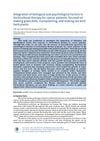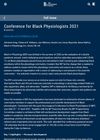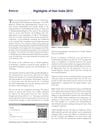 November 2024 in “Frontiers in Medicine”
November 2024 in “Frontiers in Medicine” Cirrhosis affects quality of life with various symptoms, requiring a holistic, multidisciplinary approach for management.

YH0618 helps reduce chemotherapy-induced hair loss by targeting specific proteins and pathways.
 May 2024 in “Drug discovery today”
May 2024 in “Drug discovery today” Thyroid receptor β can help develop new drugs to treat hair loss.
April 2024 in “Molecules/Molecules online/Molecules annual” Paris polyphylla saponins may effectively treat acne due to their antibacterial and anti-inflammatory properties.
 January 2024 in “Cosmetics”
January 2024 in “Cosmetics” HAIR & SCALP COMPLEX may help treat hair loss by stimulating hair growth and restarting the hair cycle.
 1 citations,
December 2023 in “Scientific reports”
1 citations,
December 2023 in “Scientific reports” 3D microenvironments in microwells improve hair follicle stem cell behavior and hair regeneration.
 138 citations,
July 2015 in “Clinical, Cosmetic and Investigational Dermatology”
138 citations,
July 2015 in “Clinical, Cosmetic and Investigational Dermatology” Eating less sugar, milk, and saturated fats and more vegetables and fish may help treat and prevent acne.
 August 2024 in “EMJ Dermatology”
August 2024 in “EMJ Dermatology” Non-scarring alopecia in females affects emotional well-being and requires accurate diagnosis and personalized treatment.
 January 2024 in “Authorea (Authorea)”
January 2024 in “Authorea (Authorea)” Nanomaterials can significantly improve wound healing and future treatments may include smart, real-time monitoring.
17 citations,
August 2018 in “Clinics in Dermatology” Skin and hair-picking disorders are common and need both skin and mental health treatments.
 March 2023 in “Scientific Reports”
March 2023 in “Scientific Reports” Using focused ultrasound on the brain can help epilepsy medicine work better in rats.
 50 citations,
June 1999 in “Annals of Oncology”
50 citations,
June 1999 in “Annals of Oncology” Giving docetaxel weekly at 40 mg/m² is manageable and has low toxicity for cancer patients.
 3 citations,
February 2014 in “The Journal of Korean Medicine Ophthalmology and Otolaryngology and Dermatology”
3 citations,
February 2014 in “The Journal of Korean Medicine Ophthalmology and Otolaryngology and Dermatology” Herbal medicine and acupuncture helped regrow hair and reduce pain in a patient with Alopecia Areata.
 July 2019 in “Acta horticulturae”
July 2019 in “Acta horticulturae” Horticultural therapy helped cancer patients feel hopeful and positive about their disease experience.
4 citations,
June 2015 in “Connective tissue research” The research found changes in gene expression related to cell death in mouse skin that help understand hair follicle development and skin health.
 March 2024 in “Daehan budongsan hakoeji/Daehan bu'dongsan haghoeji”
March 2024 in “Daehan budongsan hakoeji/Daehan bu'dongsan haghoeji” Different factors like age, size, and location of subway stations affect sales of hair salons, coffee shops, and convenience stores in Seoul differently.
8 citations,
June 2023 in “Journal of clinical medicine” Nanofat shows promise for facial rejuvenation and treating skin issues but needs more research for long-term safety.
 22 citations,
January 2018 in “Experimental Dermatology”
22 citations,
January 2018 in “Experimental Dermatology” The meeting focused on understanding, diagnosing, and finding treatments for irreversible hair loss diseases.
 4 citations,
March 2021 in “JAMA”
4 citations,
March 2021 in “JAMA” Primary care in 2021 focused on identifying nonscarring hair loss and managing common types based on the pattern of hair loss.
 1 citations,
August 2021 in “International Journal of Dermatology”
1 citations,
August 2021 in “International Journal of Dermatology” The LGBT-focused curriculum improved dermatology residents' confidence in treating LGBT patients.
 January 2018 in “Skin appendage disorders”
January 2018 in “Skin appendage disorders” The document focused on hair disorders, especially alopecia, and discussed treatments and impacts on quality of life.
 May 2001 in “Hair transplant forum international”
May 2001 in “Hair transplant forum international” Current research is focused on understanding how to control hair growth.
 January 2025 in “HORMONES”
January 2025 in “HORMONES” Gender-affirming hormone treatments need better patient-focused outcome measurements and standardized data collection.
 September 2021 in “Physiology News”
September 2021 in “Physiology News” The first Conference for Black Physiologists focused on supporting Black physiologists' careers and included talks, panels, and awards.

A man with a rare lung-focused form of hypereosinophilic syndrome improved with steroid treatment.
 1 citations,
January 2012 in “International Journal of Trichology”
1 citations,
January 2012 in “International Journal of Trichology” Hair India 2012 was a successful international event focused on combating fake trichology practices and discussing various hair health topics.
 November 2022 in “Current Psychology”
November 2022 in “Current Psychology” Ads showing gradual change work better for people less focused on new beginnings, while ads showing immediate change work better for those highly motivated by fresh starts.
 May 2015 in “Hair transplant forum international”
May 2015 in “Hair transplant forum international” The American Society of Hair Restoration Surgery (ASHRS) is a group focused on improving hair restoration methods.
 January 2015 in “Hair transplant forum international”
January 2015 in “Hair transplant forum international” The Polish Society of Hair Restoration Surgery is a regional group focused on improving hair surgery techniques.
 September 2014 in “Hair transplant forum international”
September 2014 in “Hair transplant forum international” The Asian Association of Hair Restoration Surgeons is a group focused on improving hair restoration techniques in Asia.


























